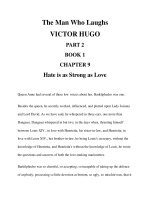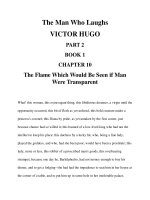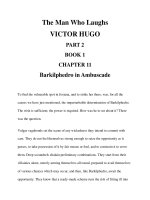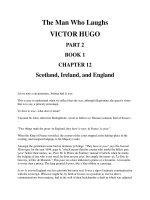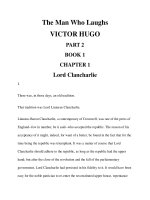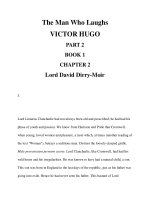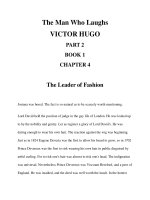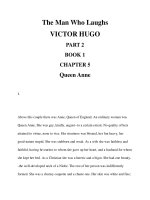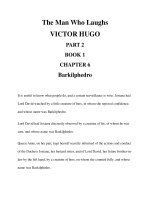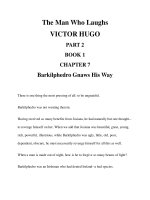The Man Who Laughs VICTOR HUGO PART 2 BOOK 1 CHAPTER 4 pdf
Bạn đang xem bản rút gọn của tài liệu. Xem và tải ngay bản đầy đủ của tài liệu tại đây (28.8 KB, 11 trang )
The Man Who Laughs
VICTOR HUGO
PART 2
BOOK 1
CHAPTER 4
The Leader of Fashion
Josiana was bored. The fact is so natural as to be scarcely worth mentioning.
Lord David held the position of judge in the gay life of London. He was looked up
to by the nobility and gentry. Let us register a glory of Lord David's. He was
daring enough to wear his own hair. The reaction against the wig was beginning.
Just as in 1824 Eugene Deveria was the first to allow his beard to grow, so in 1702
Prince Devereux was the first to risk wearing his own hair in public disguised by
artful curling. For to risk one's hair was almost to risk one's head. The indignation
was universal. Nevertheless Prince Devereux was Viscount Hereford, and a peer of
England. He was insulted, and the deed was well worth the insult. In the hottest
part of the row Lord David suddenly appeared without his wig and in his own hair.
Such conduct shakes the foundations of society. Lord David was insulted even
more than Viscount Hereford. He held his ground. Prince Devereux was the first,
Lord David Dirry-Moir the second. It is sometimes more difficult to be second
than first. It requires less genius, but more courage. The first, intoxicated by the
novelty, may ignore the danger; the second sees the abyss, and rushes into it. Lord
David flung himself into the abyss of no longer wearing a wig. Later on these lords
found imitators. Following these two revolutionists, men found sufficient audacity
to wear their own hair, and powder was introduced as an extenuating circumstance.
In order to establish, before we pass on, an important period of history, we should
remark that the first blow in the war of wigs was really struck by a Queen,
Christina of Sweden, who wore man's clothes, and had appeared in 1680, in her
hair of golden brown, powdered, and brushed up from her head. She had, besides,
says Misson, a slight beard. The Pope, on his part, by a bull of March 1694, had
somewhat let down the wig, by taking it from the heads of bishops and priests, and
in ordering churchmen to let their hair grow.
Lord David, then, did not wear a wig, and did wear cowhide boots. Such great
things made him a mark for public admiration. There was not a club of which he
was not the leader, not a boxing match in which he was not desired as referee. The
referee is the arbitrator.
He had drawn up the rules of several clubs in high life. He founded several resorts
of fashionable society, of which one, the Lady Guinea, was still in existence in Pall
Mall in 1772. The Lady Guinea was a club in which all the youth of the peerage
congregated. They gamed there. The lowest stake allowed was a rouleau of fifty
guineas, and there was never less than 20,000 guineas on the table. By the side of
each player was a little stand on which to place his cup of tea, and a gilt bowl in
which to put the rouleaux of guineas. The players, like servants when cleaning
knives, wore leather sleeves to save their lace, breastplates of leather to protect
their ruffles, shades on their brows to shelter their eyes from the great glare of the
lamps, and, to keep their curls in order, broad-brimmed hats covered with flowers.
They were masked to conceal their excitement, especially when playing the game
of quinze. All, moreover, had their coats turned the wrong way, for luck. Lord
David was a member of the Beefsteak Club, the Surly Club, and of the
Splitfarthing Club, of the Cross Club, the Scratchpenny Club, of the Sealed Knot, a
Royalist Club, and of the Martinus Scribblerus, founded by Swift, to take the place
of the Rota, founded by Milton.
Though handsome, he belonged to the Ugly Club. This club was dedicated to
deformity. The members agreed to fight, not about a beautiful woman, but about an
ugly man. The hall of the club was adorned by hideous portraits Thersites,
Triboulet, Duns, Hudibras, Scarron; over the chimney was Æsop, between two
men, each blind of an eye, Cocles and Camoëns (Cocles being blind of the left,
Camoëns of the right eye), so arranged that the two profiles without eyes were
turned to each other. The day that the beautiful Mrs. Visart caught the small pox
the Ugly Club toasted her. This club was still in existence in the beginning of the
nineteenth century, and Mirabeau was elected an honorary member.
Since the restoration of Charles II. revolutionary clubs had been abolished. The
tavern in the little street by Moorfields, where the Calf's Head Club was held, had
been pulled down; it was so called because on the 30th of January, the day on
which the blood of Charles I. flowed on the scaffold, the members had drunk red
wine out of the skull of a calf to the health of Cromwell. To the republican clubs
had succeeded monarchical clubs. In them people amused themselves with
decency.
* * * * * * *
There was the Hell-fire Club, where they played at being impious. It was a joust of
sacrilege. Hell was at auction there to the highest bidder in blasphemy.
There was the Butting Club, so called from its members butting folks with their
heads. They found some street porter with a wide chest and a stupid countenance.
They offered him, and compelled him, if necessary, to accept a pot of porter, in
return for which he was to allow them to butt him with their heads four times in the
chest, and on this they betted. One day a man, a great brute of a Welshman named
Gogangerdd, expired at the third butt. This looked serious. An inquest was held,
and the jury returned the following verdict: "Died of an inflation of the heart,
caused by excessive drinking." Gogangerdd had certainly drunk the contents of the
pot of porter.
There was the Fun Club. Fun is like cant, like humour, a word which is
untranslatable. Fun is to farce what pepper is to salt. To get into a house and break
a valuable mirror, slash the family portraits, poison the dog, put the cat in the
aviary, is called "cutting a bit of fun." To give bad news which is untrue, whereby
people put on mourning by mistake, is fun. It was fun to cut a square hole in the
Holbein at Hampton Court. Fun would have been proud to have broken the arm of
the Venus of Milo. Under James II. a young millionaire lord who had during the
night set fire to a thatched cottage a feat which made all London burst with
laughter was proclaimed the King of Fun. The poor devils in the cottage were
saved in their night clothes. The members of the Fun Club, all of the highest
aristocracy, used to run about London during the hours when the citizens were
asleep, pulling the hinges from the shutters, cutting off the pipes of pumps, filling
up cisterns, digging up cultivated plots of ground, putting out lamps, sawing
through the beams which supported houses, breaking the window panes, especially
in the poor quarters of the town. It was the rich who acted thus towards the poor.
For this reason no complaint was possible. That was the best of the joke. Those
manners have not altogether disappeared. In many places in England and in
English possessions at Guernsey, for instance your house is now and then
somewhat damaged during the night, or a fence is broken, or the knocker twisted
off your door. If it were poor people who did these things, they would be sent to
jail; but they are done by pleasant young gentlemen.
The most fashionable of the clubs was presided over by an emperor, who wore a
crescent on his forehead, and was called the Grand Mohawk. The Mohawk
surpassed the Fun. Do evil for evil's sake was the programme. The Mohawk Club
had one great object to injure. To fulfil this duty all means were held good. In
becoming a Mohawk the members took an oath to be hurtful. To injure at any
price, no matter when, no matter whom, no matter where, was a matter of duty.
Every member of the Mohawk Club was bound to possess an accomplishment.
One was "a dancing master;" that is to say he made the rustics frisk about by
pricking the calves of their legs with the point of his sword. Others knew how to
make a man sweat; that is to say, a circle of gentlemen with drawn rapiers would
surround a poor wretch, so that it was impossible for him not to turn his back upon
some one. The gentleman behind him chastised him for this by a prick of his
sword, which made him spring round; another prick in the back warned the fellow
that one of noble blood was behind him, and so on, each one wounding him in his
turn. When the man, closed round by the circle of swords and covered with blood,
had turned and danced about enough, they ordered their servants to beat him with
sticks, to change the course of his ideas. Others "hit the lion" that is, they gaily
stopped a passenger, broke his nose with a blow of the fist, and then shoved both
thumbs into his eyes. If his eyes were gouged out, he was paid for them.
Such were, towards the beginning of the eighteenth century, the pastimes of the
rich idlers of London. The idlers of Paris had theirs. M. de Charolais was firing his
gun at a citizen standing on his own threshold. In all times youth has had its
amusements.
Lord David Dirry-Moir brought into all these institutions his magnificent and
liberal spirit. Just like any one else, he would gaily set fire to a cot of woodwork
and thatch, and just scorch those within; but he would rebuild their houses in stone.
He insulted two ladies. One was unmarried he gave her a portion; the other was
married he had her husband appointed chaplain.
Cockfighting owed him some praiseworthy improvements. It was marvellous to
see Lord David dress a cock for the pit. Cocks lay hold of each other by the
feathers, as men by the hair. Lord David, therefore, made his cock as bald as
possible. With a pair of scissors he cut off all the feathers from the tail and from
the head to the shoulders, and all those on the neck. So much less for the enemy's
beak, he used to say. Then he extended the cock's wings, and cut each feather, one
after another, to a point, and thus the wings were furnished with darts. So much for
the enemy's eyes, he would say. Then he scraped its claws with a penknife,
sharpened its nails, fitted it with spurs of sharp steel, spat on its head, spat on its
neck, anointed it with spittle, as they used to rub oil over athletes; then set it down
in the pit, a redoubtable champion, exclaiming, "That's how to make a cock an
eagle, and a bird of the poultry yard a bird of the mountain."
Lord David attended prize-fights, and was their living law. On occasions of great
performances it was he who had the stakes driven in and ropes stretched, and who
fixed the number of feet for the ring. When he was a second, he followed his man
step by step, a bottle in one hand, a sponge in the other, crying out to him to hit
hard, suggesting stratagems, advising him as he fought, wiping away the blood,
raising him when overthrown, placing him on his knee, putting the mouth of the
bottle between his teeth, and from his own mouth, filled with water, blowing a fine
rain into his eyes and ears a thing which reanimates even a dying man. If he was
referee, he saw that there was no foul play, prevented any one, whosoever he might
be, from assisting the combatants, excepting the seconds, declare the man beaten
who did not fairly face his opponent, watched that the time between the rounds did
not exceed half a minute, prevented butting, and declared whoever resorted to it
beaten, and forbade a man's being hit when down. All this science, however, did
not render him a pedant, nor destroy his ease of manner in society.
When he was referee, rough, pimple-faced, unshorn friends of either combatant
never dared to come to the aid of their failing man, nor, in order to upset the
chances of the betting, jumped over the barrier, entered the ring, broke the ropes,
pulled down the stakes, and violently interposed in the battle. Lord David was one
of the few referees whom they dared not thrash.
No one could train like him. The pugilist whose trainer he consented to become
was sure to win. Lord David would choose a Hercules massive as a rock, tall as a
tower and make him his child. The problem was to turn that human rock from a
defensive to an offensive state. In this he excelled. Having once adopted the
Cyclops, he never left him. He became his nurse; he measured out his wine,
weighed his meat, and counted his hours of sleep. It was he who invented the
athlete's admirable rules, afterwards reproduced by Morley. In the mornings, a raw
egg and a glass of sherry; at twelve, some slices of a leg of mutton, almost raw,
with tea; at four, toast and tea; in the evening, pale ale and toast; after which he
undressed his man, rubbed him, and put him to bed. In the street he never allowed
him to leave his sight, keeping him out of every danger runaway horses, the
wheels of carriages, drunken soldiers, pretty girls. He watched over his virtue. This
maternal solicitude continually brought some new perfection into the pupil's
education. He taught him the blow with the fist which breaks the teeth, and the
twist of the thumb which gouges out the eye. What could be more touching?
Thus he was preparing himself for public life to which he was to be called later on.
It is no easy matter to become an accomplished gentleman.
Lord David Dirry-Moir was passionately fond of open-air exhibitions, of shows, of
circuses with wild beasts, of the caravans of mountebanks, of clowns, tumblers,
merrymen, open-air farces, and the wonders of a fair. The true noble is he who
smacks of the people. Therefore it was that Lord David frequented the taverns and
low haunts of London and the Cinque Ports. In order to be able at need, and
without compromising his rank in the white squadron, to be cheek-by-jowl with a
topman or a calker, he used to wear a sailor's jacket when he went into the slums.
For such disguise his not wearing a wig was convenient; for even under Louis
XIV. the people kept to their hair like the lion to his mane. This gave him great
freedom of action. The low people whom Lord David used to meet in the stews,
and with whom he mixed, held him in high esteem, without ever dreaming that he
was a lord. They called him Tom-Jim-Jack. Under this name he was famous and
very popular amongst the dregs of the people. He played the blackguard in a
masterly style: when necessary, he used his fists. This phase of his fashionable life
was highly appreciated by Lady Josiana.
